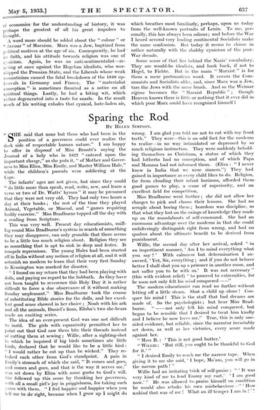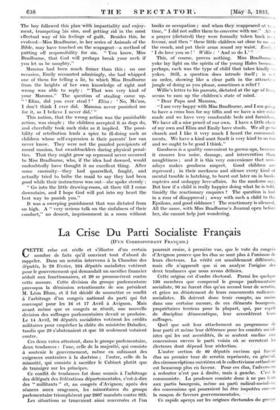Sparing the Rod
BY HELEN SIMPSON.
f' SHE said that none but those who had been in the position of a governess could ever realize the dark side of respectable human nature." I am happy to offer in disproof of Miss Bronte's saying the Journal of a lady who in 1822 " entered upon the important charge," as she puts it, " of Mother and Gover- ness to Miss Eliza, Miss Emily, and Master William Hale," while the children's parents were soldiering at the Cape. The infants' ages are not given, but since they could "do little more than speak, read, write, sew, and learn a verse or two of Dr. Watts' hymns " it may be presumed that they were not very old. They had only two hours a day at their books ; the rest of the time they played Animal, Vegetable, or Mineral, and " games requiring bodily exercise." MisS Bradburne topped off the day with a reading from Scripture.
This was very well. Present day educationists, sniff- ing round Miss Bradburne's system in search of something they may disapprove, can only grumble that there seems to be a little too much religion about. Religion they see as something that is- apt to- sink in deep and fester. It compels repressions. The young Hales had- been started off in India without any notion of religion at all, and it will astonish no.modern to learn that their very first Sunday in Kensington was marked for disaster.
" I found on my return that they had been playing with dolls, and paying no regard to the Sabbath. As they-have not been taught to reverence this Holy Day it is rather difficult to force a due observance of it without making Sunday -unpleasant"- Miss- Bradburne took the course of substituting Bible stories for the dolls; and her excel-. lent good sense showed in her choice ; Noah with his ark and all the animals, Daniel's lions, Elisha's two she-bears made an exciting series.
The idea of an- ever-present God was one not difficult to instil. The girls with equanimity permitted her to point out that God saw them bite their threads instead of cutting them at sewing ; Willie,- after a sighting-shot in which he inquired if big birds sometimes ate little birds, declared that he would like to be a little bird : I would rather be eat up than be wicked." They re- buked each other from God's standpoint. A pain in Emily's stomach of which she said, " It comes and goes, and comes and goes, and that is the way it serves me," was set down by Eliza with -some gusto to God's will. She followed up this score by thanking her governess, with all a small girl's joy in priggishness, for taking such Mains with them. " Ifeel happier and happier when you tell me to do-right, because when I grow up I might do wrong. I am glad you told me not to eat with my front teeth." They were—this is an odd fact for the moderns to realize—in no way intimidated or depressed by so Much religious instruction. They were suddenly behold- ing themselves as Christians, a status of which they had hitherto had no conception, and of which Papa and Mamma had not informed them. (Eliza : " I never knew in India that we were sinners.") They had gained in importance as every child likes to do. Religion, far from clouding their infant horizons, -afforded them good games to play, a sense of superiority, and an excellent field for competition. • • Miss Bradburne went further ; she did not allow her charges to pick and choose their lessons. She had no scruple about boring them ; boredom was discipline, so that what they lost on the swings of knowledge they made up on the roundabouts of self-command. She had an enormous advantage over the moderns in that she could unfalteringly distinguish right from- wrong, and had no qualms about the ultimate benefit to be derived from punishment.
Willie, the second day after her .- arrival, asked " in an impertinent manner, ' Am I to mind everything what you say ? ' With calmness but determination I an- swered, ' Yes, Sir, everything ; and if you do not behave better I shall shut you up a prisoner in another room, and not suffer you to be with us.' It was not necessary " (this with evident relief) " to proceed to extremities, for he soon not only felt his mind conquered—" The modern educationist can read no further without letting off a little steam. Shut a child up alone ! Con- quer his mind ! This is the stuff that bad dreams are made of. So the psychologists ; but hear Miss Brad- burne. " —not only felt his _mind conquered, but began to be sensible that I desired to treat him kindly and I believe he now loves me." True, this is only one- sided evidence, but reliable, since the narrator invariably set down, as well as her victories, every score made against her. .
" Miss B.: This is not good butter.'
" WILLIE : But still, you ought to be thankful to God for it.' " " I desired Emily to reach me the narrow tape. When giving it to me she said, ' I hope,- Ma'am, you will go in the narrow path ! "
Willie had an irritating trick of self-praise : " ! It was very kind of me to lend Emmy my cart.' I am good now.' He was .allowed to ,praise himself on condition he -would also rebuke. his own misbehaviour,---" ' How Unkind that was of me What an ill. temper I am in ! ".- The boy follovred this plan' with impartiality and enjoY- ment, trumpeting his- sins, and getting- rid in the most effectual way of - his feelings of guilt. Besides this, he evolved—Miss Bradburne, in her series of Animals of the Bible, may have touched on the scapegoat—a method of putting off responsibility for sin. ". You know, Miss Bradburne, that God will perhaps break your neck if yOu let us be naughty." • Mamina had been much firmer than this ; on one occasion, Emily recounted admiringly, she had whipped one of them for telling a lie, to which Miss Bradbume from the heights of her own knowledge of right and wrong was able to reply : " That was very kind of your Mamma." The question of stealing came up. " ' Eliza, did you ever steal ? ' Eliza : ' No, Ma'am, I don't think I ever did. Mamma never punished me for it, so I believe I never did.' " This notion, that the wrong action was the punishable action, was simple ; the children accepted it as dogs do, and cheerfully took such risks as it implied. The possi- bility of retribution lends a spice, to ill-doing such as children whose self-expression is their parents' law can never know. They were not the puzzled percipients of moral suasion, but swashbucklers daring physical penal- ties. That they might grow up repressed never occurred to Miss Bradbume, who, if the idea had dawned, would undoubtedly have thought it an excellent thing. After some enormity—they had quarrelled, fought, and actually tried to bribe the maid to say they had been good while their instructress was out—she spoke sternly : " Go into the little drawing-room, sit there till I come downstairs, and I hope God will put into my heart the best way to punish you."
It was a sweeping punishment that was dictated from on high. A " very serious talk on the sinfulness of their conduct," no dessert, imprisonment in a room without books or occdpation ;• and when-they reappeared.at te.:- tune, " I did 'not-suffer them to converse with me:" Aft, r a prayer (dictated) they were formally taken back in favour; and then !` these little children sat close- to me 011 the couch, and put their arms round my ivaist: Emil I do love you so ! ' Willie : And so do I."!
This, of course, proves nothing. Miss Bradburne., yoke lay light on the spirits of the young Hales because•. perhaps, each was the type of child that takes kindly to yokes. Still, a question does intrude itself ; is no.; an order, showing like a clear path in the attracti'. jungle of doing 'as you•please, sometimes a-relief ?
Willie's letter to his parents, dictated at the age Of four, seems -to sum up the: children's state of mind. • " Dear Papa -and Mamma, "I am very-happy with Miss Bradburne, and I am going to have a cross bun for my tiffin and we have a nice cake made and we have very comforable beds and furnisher. We have all a nice pencil of our own. I have a little chair of my own and Elizaand Emily have stools. We all go to church and I Like it very much I heard the, command. ments. We have a kind aunt Smelt is very kind to us too and we ought to be good I think."
Goodness is a quality convenient to grown-ups, because it ensures less noise, damage, and intervention than naughtiness ; and it is this very convenience that now- adays makes goodness suspect. Good children are repressed ; in their meekness and silence every kind of mental trouble is hatching, to burst out later on in bank- ruptcies and unhappy love-affairs. So the moderns say. But how if a child is really happier doing what he is told, timidly the reactionary enquires ? The question is lost in a roar of disapproval ; away with such a child to the Epsilons, and good riddance ! The reactionary is silenced. All the same, with Miss Bradburne's Journal open before her, she cannot help just wondering. •











































 Previous page
Previous page